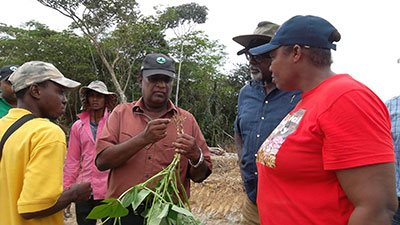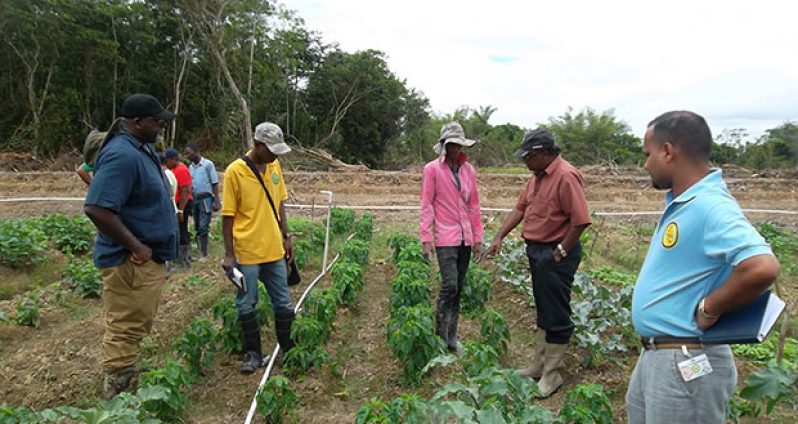Sabina Farms, situated in St. Lawrence, East Bank Essequibo, is being developed as a large-scale modern self-sustainable organic farm. Thus far, 20 acres of land are being prepared to accommodate a plant nursery, barn house, three shade houses, beds for crops and a pig farm.
The owner, David Apariso, a re-migrant Guyanese, intends to export and supply local commercial enterprises with packaged products. He is determined to ensure that the best farming practices

are observed on Sabina Farms; hence, the need for a close working relationship with the National Agricultural Research and Extension Institute (NAREI).
Sabina Farms is a recipient of technical support from NAREI. On Tuesday, the Chief Executive Officer of NAREI, Dr. Oudho Homenauth and a team comprising Extension Officers visited the development site to have a firsthand look at the operations.
Sabina Farms is in the initial stage of development and is bustling with activities such as setting of seedlings, land clearing, creation of drainage and irrigation canals and crop trials. The farm has provided employment opportunities for seven persons. This number will certainly increase in the future.
For the past eight to 12 weeks a number of crops, such as red beans, cabbage, lettuce, pepper, and callaloo were planted to determine whether they could grow on the soil type. The crop trials revealed that the soil type is conducive to a variety of crops.
Apariso related that during the trial period, limestone and manures from poultry and cows were used to replenish the soil. In the future, waste from pigs and poultry reared on the farm will be utilized to ensure the farm remains green and self-sufficient.
The use of organic materials to fertilize the land and prevent pests will be the hallmark of Sabina Farms. The dream is to produce crops that could be taken from the farm straight to the table, he said.
Dr. Homenauth advised that the leaves of the red bean plant could be chopped and added to the soil. This would increase the nitrogen content of the soil and is a good source of green manure.
He said that red bean is the ideal plant to intercrop with sour soup. Two acres of land has been earmarked to cultivate sour soup. NAREI will be supplying 1,000 sour soup and 100 sijan seedlings to Sabina Farms. Dr. Homenauth emphasized that the large scale production of health foods such as sijan and sour soup is highly commendable.
Apariso envisions Sabina Farms to be a showpiece of modern farming techniques. He will be constructing three tunnel shade houses with raised beds to grow exotic crops such as broccoli and cauliflower. Dr. Homenauth invited Apariso to visit NAREI, Mon Repos location to view its tunnel shade house, where culinary herbs are being grown on trial.
Dr. Homenauth is enthused with the project since it is going to be commercial in nature and the commodities that will be produced will satisfy the local and export markets. NAREI will closely with Sabina Farms to ensure its success. Sabina Farms will be added to the list of farms that are visited by Extension Officers in Region Three. (Contributed by Keeran Singh, NAREI)




.jpg)











